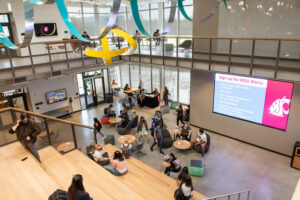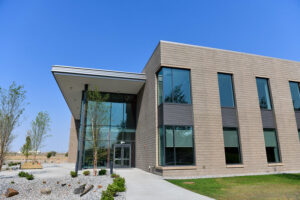Washington State University Tri‑Cities will celebrate the opening of its first fully state-funded academic building in over 30 years as part of a ribbon cutting celebration on Wednesday, Sept. 22.
The grand opening of Collaboration Hall, which runs from 4 p.m.–6 p.m., will feature remarks from university leaders, light refreshments and open tours of the building.
The event is open to the public. Those interested in attending should RSVP. COVID‑19 guidelines and requirements will apply.
Hands‑on, career-relevant learning
The building, which officially opened on the first day of fall classes this year, features a range of state-of-the-art science teaching laboratories, three large interactive classrooms, study and collaborative areas, an open atrium ideal for presentations and events, as well as an outdoor amphitheater that seats 100.
WSU Tri‑Cities Chancellor Sandra Haynes said the building was designed and constructed with student success in mind.
“Being a STEM-focused campus, this building, complete with labs specific to the full array of science disciplines, will enhance students’ education, resulting in graduates even more prepared to meet the demands of the workforce,” she said. “At WSU Tri‑Cities, we partner with a range of companies and organizations that contribute to groundbreaking research, technology development and overall community growth. As signified in its name, this building will help further academic and industry collaboration and truly help prepare our students for future careers rooted in regional needs.”

The teaching laboratories featured in the building include:
- A physics laboratory
- Two biology laboratories
- A chemistry laboratory
- An anatomy and physiology laboratory
- An environmental science laboratory
- An innovation and design laboratory
Funded by state and local support
The construction of Collaboration Hall was made possible by $3 million in design funding and $27 million in construction funding from the Washington state Legislature.
In addition to state allocations, financial contributions have been made by university leadership by naming study, collaborative and learning spaces:
- WSU President Kirk Schulz and First Lady Noel Schulz
Noel and Kirk Schulz Academic Support Lounge - WSU Tri‑Cities Chancellor Sandra Haynes
Sandra Haynes Collaboration Space in Honor of First‑Generation Students - WSU Regent Lura Powell and Art King
Lura Powell and Art King Lounge – Supporting First‑Generation and Underserved Students and STEM
The following individuals and organizations also committed to naming the seating on the grand staircase located in the atrium of Collaboration Hall. The naming of each step pays tribute to WSU Tri‑Cities students and the regional community:
- Washington River Protection Solutions
“Investing today for the challenges of tomorrow” - Central Plateau Cleanup Company
“Building our future workforce step by step” - Patrick and Tia Jensen
“In honor of first‑generation students” - Phil and Diane Ohl | Ohl Family Foundation
“We always find our way back home, Go Cougs!”
Haynes said the WSU Tri‑Cities campus community is incredibly grateful for the generous state, private and organizational support.
“It’s a stunning and functional space that, as a result of our state and community contributions, is one of the most valuable assets for our campus in fulfilling our educational mission,” she said.
Serving community needs

Collaboration Hall lives up to WSU Tri‑Cities’ historical roots. The Tri‑Cities campus dates back to the 1940s when it began as the General Electric School of Nuclear Engineering to provide educational advancement to engineers and others working at the Hanford Nuclear Site amid the Manhattan Project. Collaboration Hall was constructed to provide an educational space that would prepare regional students for current and future regional, state and national needs.
Kirk and Noel Schulz, both engineers, said the building is a prime example of a facility that capitalizes on WSU’s land‑grant mission of providing exceptional learning, research and community service.
“For a campus that thrives in providing excellent STEM education, Collaboration Hall at WSU Tri‑Cities is a fantastic place for students to learn, grow and excel, all in partnership with our regional industry,” Kirk Schulz said. “We want to thank the Washington state Legislature and the many individuals and organizations that made this facility a reality. It is a space where students will learn foundational and practical skills that will be applied to serve regional, state and national needs.”
More information on Collaboration Hall is available online.
Those interested in providing a gift or naming a space in the building should contact Jaime Heppler, WSU Tri‑Cities senior director of development, at 509‑372‑7207 or jaime.heppler@wsu.edu.







